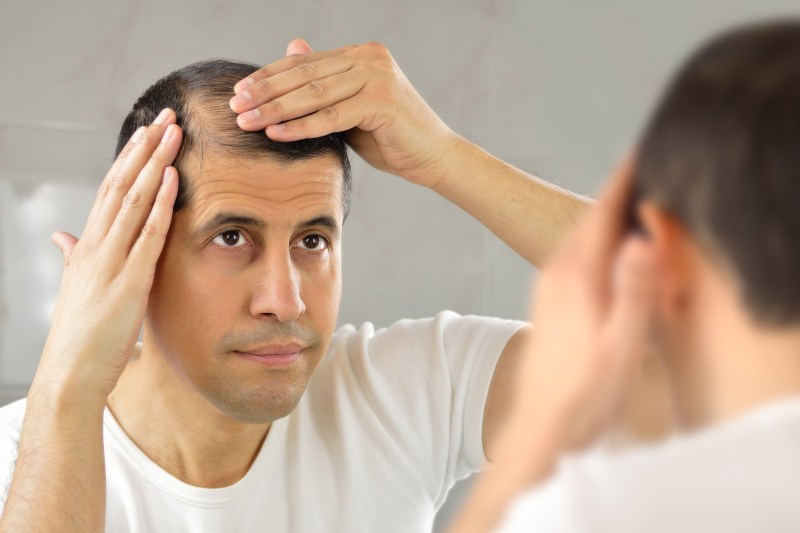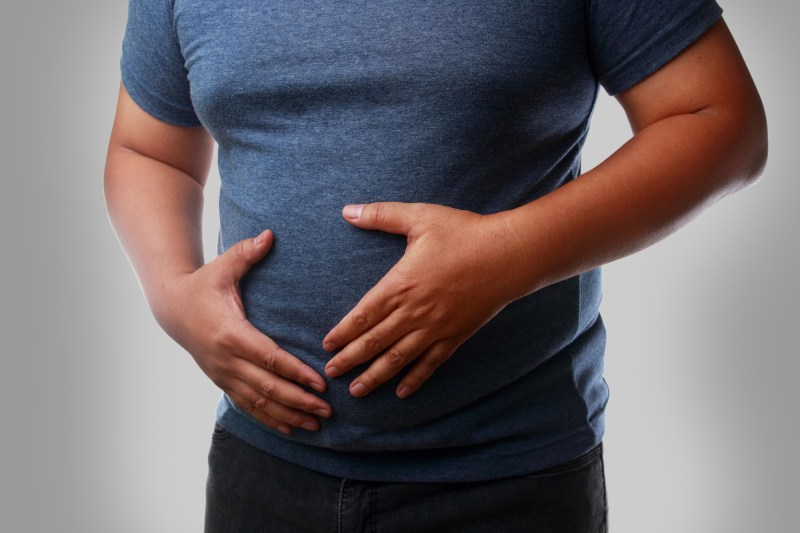Creatine is one of the most well-researched and widely used supplements for enhancing muscle growth and strength. As a trainer and nutritionist, I always recommend it to my clients to help support their fitness goals. However, some people worry about a potential link between creatine and hair loss.
The concern stems from a 2009 study that suggested creatine might increase dihydrotestosterone (DHT) levels, a hormone associated with male pattern baldness. Does this mean the answer to the question, “Can creatine cause hair loss?” is affirmative?
The scientific evidence is limited, and many experts argue that creatine alone is unlikely to be responsible for significant hair thinning. Continue reading to learn the real relationship between creatine and hair loss and other possible downsides and benefits of the supplement.
Can creatine cause hair loss?

The theory that creatine causes hair loss primarily comes from a small study conducted in 2009 on rugby players. The study found that after three weeks of creatine supplementation, participants experienced an increase in DHT levels by about 56%, just after seven days of supplementation.
Since DHT is known to contribute to male pattern baldness, this raised concerns that creatine could accelerate hair loss in individuals genetically predisposed to it. However, the study did not measure hair loss directly, and no subsequent studies have confirmed these findings.
A 2021 review published in the Journal of the International Society of Sports Nutrition stated that “the current body of evidence does not indicate that creatine supplementation causes hair loss/baldness.” Additionally, many athletes and gym-goers take creatine for years without experiencing noticeable hair thinning.
What are the benefits of creatine?

Increased muscle growth
Creatine enhances the body’s ability to produce energy rapidly, increasing strength and performance during high-intensity workouts. This improved strength and performance ultimately leads to faster muscle growth.
Research shows that creatine can significantly increase lean muscle mass over time compared to training alone. For example, a review of clinical trials published in “Nutrients” found that creatine supplementation is efficient in increasing muscle mass and athletic performance in young populations.
Improved exercise performance
By increasing phosphocreatine stores in muscles, creatine allows for greater ATP (adenosine triphosphate) production. This results in better performance in activities requiring short bursts of power, such as lifting weights and sprinting. Studies have found that creatine can significantly enhance strength gains, depending on the type of exercise.
Enhanced brain function
Creatine isn’t just beneficial for muscles; it also plays a role in brain health. Research suggests that creatine may enhance working memory and overall cognitive performance, especially in older or stressed individuals.
Are there any downsides to creatine?

While creatine is generally safe for most individuals, it’s important to be aware of potential side effects:
- Digestive issues: Creatine may cause bloating in some people. Others may experience stomach discomfort, nausea, or diarrhea, especially if they take high doses.
- Kidney and liver concerns: In healthy individuals, recommended doses of creatine haven’t been shown to harm the kidneys or liver. However, if you have existing kidney or liver problems, it’s wise to consult a healthcare provider before using creatine.
Creatine is beneficial for enhancing athletic performance, but it’s essential to use it responsibly. Stick to recommended doses and consult with a healthcare professional if you have any health concerns.
What form of creatine is the most effective?

Creatine monohydrate is the most researched and widely used form of creatine. Studies have consistently shown that it effectively enhances muscle mass, strength, and exercise performance. Its safety is well-founded, and it is generally more affordable than other forms.
Other forms of creatine, such as creatine ethyl ester, creatine hydrochloride, and buffered creatine, have been developed with claims of improved absorption or effectiveness. However, current research does not support these claims, and these forms have not been shown to be more effective than creatine monohydrate.
Creatine monohydrate is your best bet if you want the safest (according to current research) and most affordable creatine form.
Tips for getting the best results from creatine

- Stick to the recommended dosage: A common approach is a creatine loading phase of 20 grams per day for five to seven days, followed by a maintenance dose of three to five grams per day.
- Stay hydrated: Creatine draws water into muscle cells, so drinking plenty of water is crucial to avoid dehydration.
- Take it consistently: While there is no particular best time to take creatine, daily supplementation helps maintain optimal muscle creatine levels.
- Pair with carbohydrates or protein: Taking creatine with carbs and protein can improve its uptake by the muscles.
Frequently asked questions

Will hair grow back after creatine?
Creatine has not been proven to cause hair loss. Hence, your hair would not need to grow back after creatine. However, if creatine does have any impact on hair loss, it would likely be due to increased dihydrotestosterone (DHT), which binds to hair follicle receptors and causes them to shrink.
Since creatine does not permanently alter hormones, stopping supplementation should, in theory, allow hair growth to return to its natural rate if an effect on baldness was even present in the first place.
What does creatine do to your hair?
There is no conclusive evidence that creatine directly affects hair growth or hair loss. While a single study suggested a temporary increase in DHT levels, this has not been replicated in further research. Many users take creatine for years without experiencing hair thinning.
Are creatine gains permanent?
Creatine helps increase muscle mass by improving strength and workout performance. However, stopping creatine supplementation may lead to a slight decrease in water retention within muscles, causing a minor loss in size. The actual muscle mass gained through training will remain as long as exercise continues.




